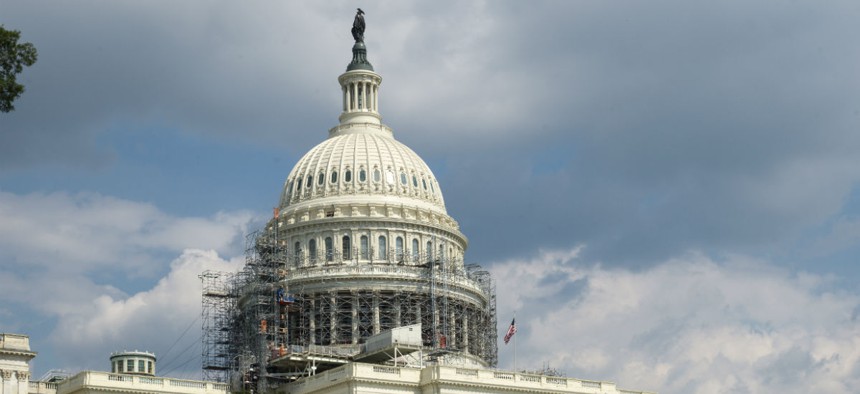
Architect of the Capitol
House Votes to Make It Easier to Fire VA Employees
The bill, which the Senate is unlikely to pass, is the latest congressional attempt to improve accountability at the department.
The House on Wednesday passed major legislation that would reform the disciplinary process for personnel at the Veterans Affairs Department by making it easier to fire and demote employees.
H.R. 5620, which passed on a 310-116 vote, reduces the amount of time allotted to notify and discipline VA employees the agency intends to demote or fire. The measure also would give the secretary clear authority to rescind bonuses, retirement benefits and relocation expenses from employees under certain circumstances, and would prohibit all VA senior executives from receiving awards or bonuses from fiscal 2017 through 2021.
Under the VA Accountability First and Appeals Modernization Act, rank-and-file employees who have been fired because of performance or misconduct and appeal that decision to the Merit Systems Protection Board would not receive pay, bonuses, or certain other benefits while the appeal is pending. Senior executives would no longer be able to appeal removals or demotions to MSPB; instead they could appeal to an internal Senior Executive Disciplinary Appeals Board. The secretary could reverse that board’s decision.
The bill’s sponsor, House Veterans’ Affairs Committee Chairman Jeff Miller, R-Fla., said the legislation “gets rid of the loopholes that have been unfairly forcing veterans and the many good VA workers to deal with deadwood employees for years.” H.R. 5620 now heads to the Senate; Sen. Marco Rubio, R-Fla., is sponsoring companion legislation in the upper chamber.
The major employee accountability provisions in H.R. 5620 would:
- Impose a shorter disciplinary process for rank-and-file employees who are fired or demoted. The entire process – from notification to the MSPB’s decision on an appeal – would be limited to 77 days.
- Give the VA secretary authority to strip pension benefits from VA senior executives who are convicted of a crime that influenced their job performance, and then fired. The bill also would prevent senior executives about to be fired because they were convicted of such a felony, but who instead retire, from receiving their full retirement benefits. The secretary would be allowed to take away the government contribution portion of the pension for the time period in which the employee was engaged in behavior warranting removal.
- Allow the VA secretary to recoup bonuses from VA employees when appropriate, with notification and an opportunity for appeal.
- Allow the VA secretary to recoup relocation expenses from VA employees who’ve engaged in misconduct, with notification and opportunity for appeal.
House Democrats, including Veterans’ Affairs Committee Ranking Member Mark Takano, D-Calif., offered unsuccessful amendments aimed at narrowing the accountability language. One successful amendment offered by Rep. Beto O’Rourke, D-Texas, gives the VA the authority to offer doctors conditional job offers two years in advance and boosts the department’s recruiting effort at colleges and medical schools.
The bill also would fix the lengthy and complicated disability claims appeals process for veterans. Currently, there are more than 450,000 pending appeals, with vets waiting an average of three years for a decision. The White House expressed concern over the employee accountability provisions in H.R. 5620, but did not threaten to veto it because it strongly supports the plan to improve the disability claims appeals process.
“The essential feature of this new approach is to step away from a unified appeals process that tries to do many unrelated things inside a single process and replace that with differentiated lanes, which give veterans clear options after receiving an initial decision on a claim,” the administration said of the appeals reform plan. “And it would allow all veterans to have a clear answer and path forward on their appeal within one year from filing.”
Of the accountability provisions in the bill, the administration said it believes the legislation’s approach “significantly alters and diminishes important rights and protections that are available to the vast majority of other employees across the government and which are essential to safeguarding employees' rights and the merit system.”
The Senior Executives Association and the American Federation of Government Employees – which represents 230,000 VA employees – both oppose the bill.







